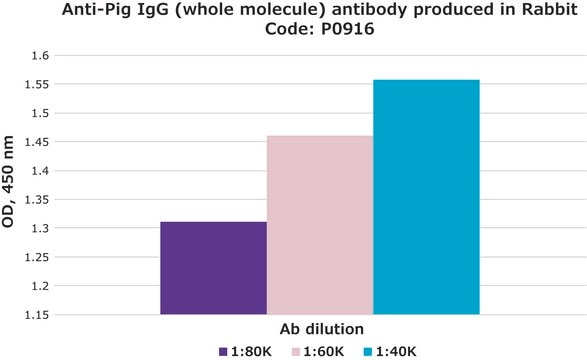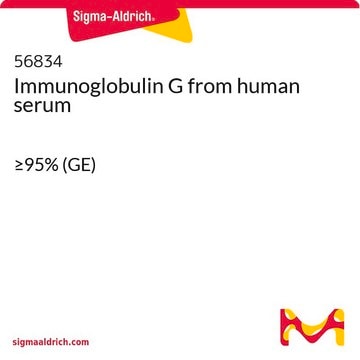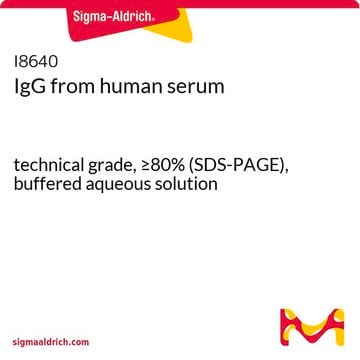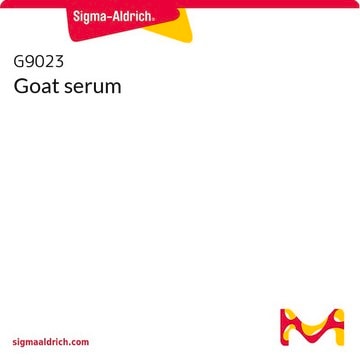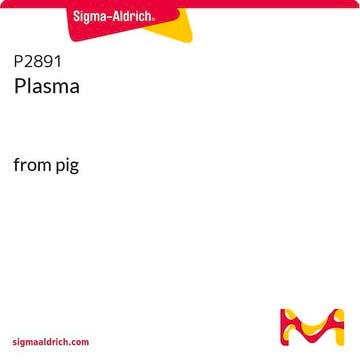I4381
IgG from porcine serum
reagent grade, ≥95% (SDS-PAGE), essentially salt-free, lyophilized powder
Sinónimos:
Pig IgG
Iniciar sesiónpara Ver la Fijación de precios por contrato y de la organización
About This Item
Productos recomendados
conjugate
unconjugated
Quality Level
grade
reagent grade
assay
≥95% (SDS-PAGE)
form
essentially salt-free, lyophilized powder
technique(s)
ELISA: suitable
storage temp.
2-8°C
target post-translational modification
unmodified
General description
IgG antibody subtype is the most abundant serum immunoglobulins of the immune system. It is secreted by B cells and is found in blood and extracellular fluids and provides protection from infections caused by bacteria, fungi and viruses. Maternal IgG is transferred to fetus through the placenta that is vital for immune defence of the neonate against infections. IgG from porcine serum specifically recognizes IgG from pig. Pig IgG is purified from normal pig serum by fractionation and ion-exchange chromatography. Immunoglobulin G (IgG) is part of the immunoglobulin family. The primary structure of this antibody contains disulfide bonds involved in linking the two heavy chains, linking the heavy and light chains and resides inside the chains.
Application
IgG from porcine serum may be used in quantitative ELISA, a concentration of 0.5 μg/ml may be used as standard. Concentrations ranging from 3.9 to 250 ng/ml were used as standards in immune response measurements. Pig IgG was also used as standard in surface plasmon resonance phase imaging studies.
Disclaimer
Unless otherwise stated in our catalog or other company documentation accompanying the product(s), our products are intended for research use only and are not to be used for any other purpose, which includes but is not limited to, unauthorized commercial uses, in vitro diagnostic uses, ex vivo or in vivo therapeutic uses or any type of consumption or application to humans or animals.
Storage Class
11 - Combustible Solids
wgk_germany
WGK 3
flash_point_f
Not applicable
flash_point_c
Not applicable
ppe
Eyeshields, Gloves, type N95 (US)
Certificados de análisis (COA)
Busque Certificados de análisis (COA) introduciendo el número de lote del producto. Los números de lote se encuentran en la etiqueta del producto después de las palabras «Lot» o «Batch»
¿Ya tiene este producto?
Encuentre la documentación para los productos que ha comprado recientemente en la Biblioteca de documentos.
Los clientes también vieron
E van Heugten et al.
Journal of animal science, 72(3), 658-664 (1994-03-01)
To investigate the effect of aflatoxin (AF) and dietary methionine (MET) on immune responses of swine, a total of 288 pigs weaned at 21 d of age were allotted to 12 dietary treatments arranged in a 3 x 4 factorial
Simone Ladel et al.
Pharmaceutics, 10(3) (2018-07-28)
The use of therapeutic antibodies for the treatment of neurological diseases is of increasing interest. Nose-to-brain drug delivery is one strategy to bypass the blood brain barrier. The neonatal Fc receptor (FcRn) plays an important role in transepithelial transcytosis of
Kuo-Hoong Lee et al.
Biosensors & bioelectronics, 23(4), 466-472 (2007-07-10)
This study reports a microfluidic chip integrated with an arrayed immunoassay for surface plasmon resonance (SPR) phase imaging of specific bio-samples. The SPR phase imaging system uses a surface-sensitive optical technique to detect two-dimensional (2D) spatial phase variation caused by
Michael Bailey et al.
Clinical and diagnostic laboratory immunology, 11(2), 337-343 (2004-03-12)
Normal piglets weaned onto soy- or egg-based diets generated antibody responses to fed protein. Concurrent infection with transmissible gastroenteritis virus (TGEV) did not affect the responses to dietary antigens at weaning, nor did it affect the subsequent development of tolerance.
Kelly A Rich et al.
Gene therapy, 29(9), 513-519 (2021-11-23)
Numerous pediatric neurogenetic diseases may be optimally treated by in utero gene therapy (IUGT); but advancing such treatments requires animal models that recapitulate developmental physiology relevant to humans. One disease that could benefit from IUGT is the autosomal recessive motor
Nuestro equipo de científicos tiene experiencia en todas las áreas de investigación: Ciencias de la vida, Ciencia de los materiales, Síntesis química, Cromatografía, Analítica y muchas otras.
Póngase en contacto con el Servicio técnico


